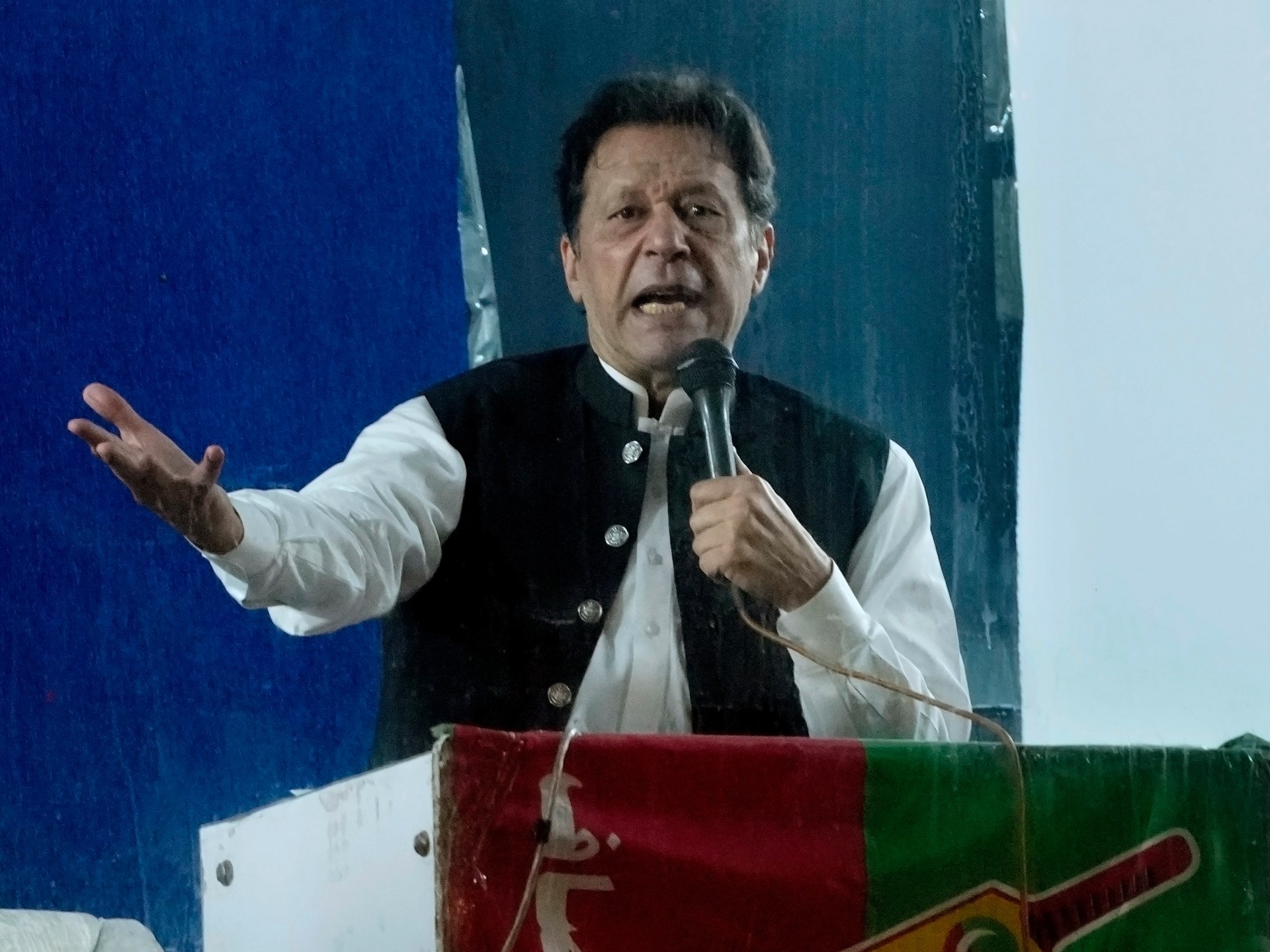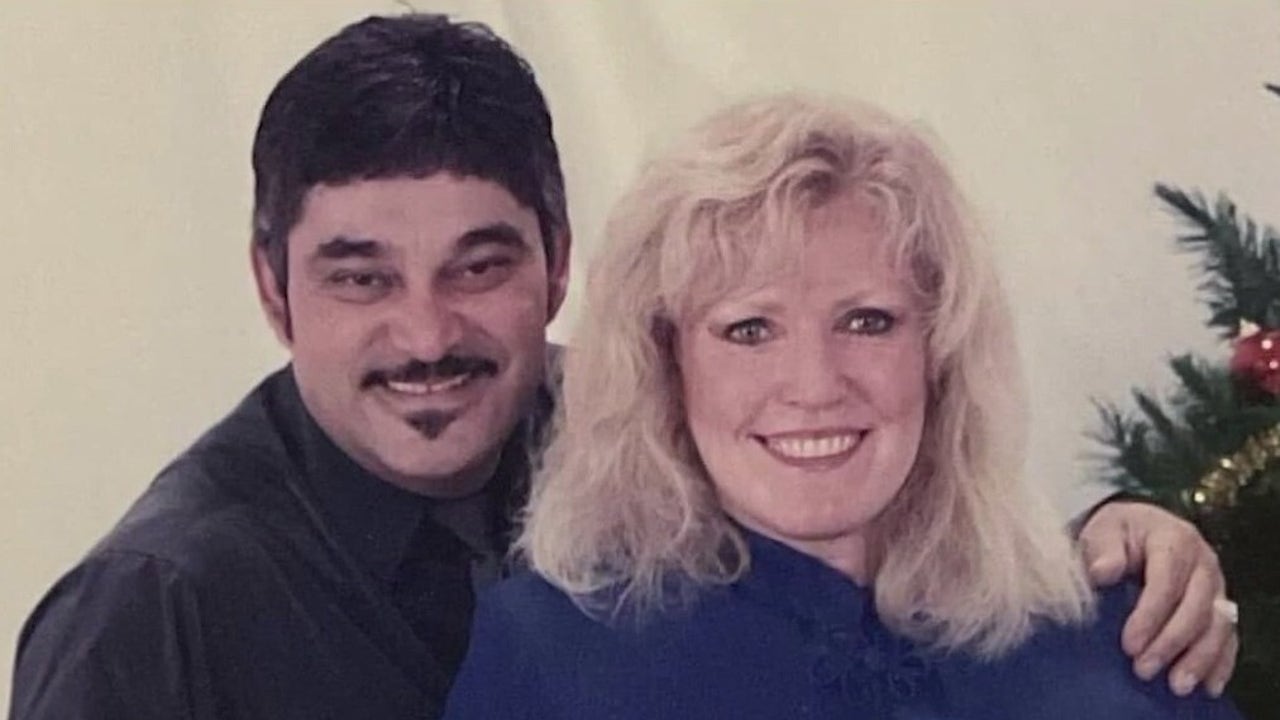World
Why was Imran Khan arrested? What happens next?

Protests and rioting have continued across Pakistan a day after former Prime Minister Imran Khan was dragged from a court in the capital Islamabad to an unknown location and his supporters clashed with police across the country.
The 70-year-old opposition leader was indicted and remanded in custody for eight days in a corruption case on Wednesday after a hearing was held in a court temporarily relocated to a police guest house in Islamabad.
Police said more than 1,000 people had been arrested since protests broke out on Tuesday following his arrest.
Khan, who was removed as prime minister last year but remains the country’s most popular opposition figure, is the seventh former prime minister to be arrested in Pakistan.
Why was Khan arrested?
Khan has been charged in more than 100 cases – including corruption, terrorism and blasphemy – since his removal from power through a parliamentary no-confidence vote.
His arrest was made in connection to the Al-Qadir Trust case initiated last year by the government of Prime Minister Shehbaz Sharif.
On Tuesday, the National Accountability Bureau (NAB) said Khan was arrested “for the crime of corruption” connected to the trust. Interior Minister Rana Sanaullah Khan confirmed that the former prime minister, leader of the Pakistan Tehreek-e-Insaf (PTI) party, was arrested in a case pursued by the anti-corruption body.
What is the Al-Qadir Trust case?
Last June, the government alleged that Khan and his wife Bushra Bibi obtained land worth billions of rupees (millions of US dollars) for the Al-Qadir University Trust, headed by the duo, from Malik Riaz – a major property tycoon of Pakistan – to build an educational institute.
NAB has alleged that Khan’s PTI government struck a deal with Riaz in a quid pro quid arrangement, wherein they allegedly helped Riaz launder more than $239m and caused a loss to the national exchequer.
How did Khan’s supporters react to the arrest?
Clashes and rioting broke out in all major cities across the country following Khan’s arrest and resumed on Wednesday as he was presented in court.
PTI supporters took to the streets in the capital Islamabad as well as Karachi, Lahore, Peshawar and other cities. Police said nearly 1,000 people have been arrested in Punjab province.
Rubber bullets being fired towards people of Pakistan in Pindi: #ReleaseImranKhan pic.twitter.com/4MXETTotRX
— PTI (@PTIofficial) May 9, 2023
The government requested that the army be deployed in response to the protests. At least one person was killed in the southwestern city of Quetta on Tuesday, and dozens were wounded in various parts of the country.
Authorities restricted access to Twitter, Facebook and other social media platforms as well as mobile broadband.
“Total internet shutdowns have been observed in some regions,” NetBlocks, the global internet monitor, said on Tuesday.
🇵🇰Pakistan: Amid concerns about escalating clashes between Imran Khan’s supporters and the police, Amnesty International is alarmed by reports that Pakistani authorities have suspended mobile internet and access to Twitter, Facebook and YouTube.
— Amnesty International South Asia, Regional Office (@amnestysasia) May 9, 2023
Khan vs the army
The former PM’s political demise was rooted in twin realities.
Inside parliament, Khan’s party had lost the support of coalition allies, denying him the majority he needed to defeat the vote of no confidence. Outside, he appeared to lose the support of Pakistan’s powerful military, which the opposition alleged helped him win the 2018 general election, and had recently publicly fallen out with the former prime minister over senior military appointments and policy decisions.
The dispute has continued, with Khan calling on the country’s president to investigate the military for an attack on him last year.
Before setting off for his hearing, Khan addressed the military’s information wing and condemned them for accusing him of bringing the military into disrepute. Shortly afterwards, he was arrested.
On Wednesday, the army said that May 9 – the day protests erupted after Khan was arrested – “will be remembered as a dark chapter” in the country’s history.
[English Subtitles] Chairman Imran Khan’s response to ISPR Press Release!
His life is in danger, but he is ready to go to any lengths for Pakistanis. We are blessed to be living in his era! May Allah protect him against all evils.#BehindYouSkipper #SubtitledByPTI pic.twitter.com/SlNH0YVivs
— PTI (@PTIofficial) May 9, 2023
What’s next?
Imran Shafique, a lawyer and former prosecutor at NAB, said that according to the regulations of NAB, Khan can be kept under custody for a maximum of 14 days.
“The court has ordered an eight-day remand for him [Khan], and it can be extended for another six days,” Shafique told Al Jazeera.
He explained that Khan will be able to seek bail once the duration of his remand is over.
“As per Pakistani law, there are two types of remands – physical and judicial – and Khan is currently being held under physical remand,” he said, adding that once the eight days are over, the former prime minister will be moved to a jail under judicial remand.
“Once he is under judicial remand,” Shafique said, “he can seek bail and the court will decide whether the bail can be granted or not.”

World
US surgeon general urges cancer warnings for alcoholic drinks

World
Boy, 7, survives 5 days alone in African game park alongside lions, elephants

A missing 7-year-old boy survived five days alone in an African game park, alongside elephants and lions, in what Zimbabwean politicians are calling “a true miracle.”
Tinotenda Pudu spent nearly a week alone in Matusadonha game park after “wander[ing] away” and losing his sense of direction, Mutsa Murombedzi, a Member Parliment in Zimbabwe, wrote in a post on X.
Pudu was found by rangers from Matusadona Africa Parks after walking nearly 15 miles from home, according to officials.
Tinotenda Pudu, 7, was found safe after spending five days in the African jungle.
SAN DIEGO ZOO TO WELCOME PAIR OF GIANT PANDAS FROM CHAIN UNDER CONSERVATION PARTNERSHIP
“After [five] long, harrowing days in the jungle near Hogwe River, which feeds into Ume river, the boy has been found alive,” Murombedzi announced. “Sleeping on a rocky perch, amidst roaring lions, passing elephants, eating wild fruits and just the unforgiving wild [is] too much for a [7]-year-old.”

The boy survived for five days living amongst lions and elephants.
The park hosts lions, leopards, buffalo, zebras, elephants, hippos and antelope, according to African Parks’ website.
OUTSIDE OF CHINA, PANDAS ARE ONLY FOUND IN THESE 5 ZOOS AROUND THE WORLD
The Nyaminyami community beat night drums each day in hopes the boy would hear the sound and find his way back home, according to Murombedzi.

An African bush elephant is seen walking on a red dirt road in Pilanesberg National Park in South Africa. (Arterra/Marica van der Meer/Universal Images Group via Getty Images)
“Above all, we thank God for watching over Tinotenda and leading him back home safely,” she said. “This is a testament to the power of unity, hope, prayer and never giving up.”
Officials confirmed the child’s age to the BBC.
World
Q&A: Leader of Myanmar’s shadow government talks civil war strategy in 2025

This year is likely to be one of the most pivotal in Myanmar’s modern history.
The country is embroiled in a civil war, ignited by the military’s 2021 coup against an elected government.
Fighting has escalated and the military regime, which calls itself the State Administration Council (SAC), has suffered mounting defeats. It has responded to the loss of control over border regions and swaths of territory to opposition forces with indiscriminate air attacks and atrocities against civilians.
The military’s most formidable opposition – a coalition of ethnic armed groups – now controls most of Rakhine state in the country’s east and from the border with China to the city of Mandalay in the north.
Another major opposition force is the National Unity Government (NUG) – described as Myanmar’s shadow government – in exile, which oversees a loose collection of anti-regime groups known as the People’s Defence Force (PDF).
The NUG faces challenges in gaining diplomatic recognition on the international front and its fighters are struggling to capture urban areas on the home front.
Al Jazeera spoke with NUG Acting President Duwa Lashi La about the movement’s military and political strategy in 2025 and the war’s likely end game.
Al Jazeera: Please describe the NUG’s strategy for 2025.
Duwa Lashi La: In 2025, we would like to accelerate the wave of our revolution. Although it began with very little resources, the revolution has become stronger. In 2022, we formed armed forces. In 2023, we could launch military operations. In 2025, we are seeking the end game. The people of Myanmar have suffered too much for all these years. We have to bear all these atrocities, while the world just watches on.
In 2025, we are aiming for the complete elimination of evil [regime leader] Min Aung Hlaing from our soil.
Armed revolution is a vital focus, but it’s not the only one. It’s politically important to have inclusive participation of all the armed forces. It’s also very important to have strong diplomatic cooperation with the international community and to gain more support from them.
Another important factor is good communication with the public, and good governing in our controlled areas. We’re aiming to improve in all these areas in the new year. To achieve that, we have a strategic plan.
Al Jazeera: What do you think will happen in 2025?
Duwa Lashi La: We aim to reach a tipping point in 2025, a similar situation to Syria when al-Assad fled the country.
We have to strike a final blow against the SAC.
Parts of the international community, such as the ICC [International Criminal Court], are also attempting to prosecute Min Aung Hlaing. We completely support this. It would be great if the international community could arrest him. We’ll also continue our effort to prosecute him within our country from every way possible.
However, international intervention is essential in this transitional period.
With simultaneous and collaborative attempts between the international community and resistance forces against the SAC, we believe the SAC would be destroyed at once.
It’s very important to cut off the financial flow to the SAC to achieve this goal. The military is backed by strong resources that they have acquired from decades of controlling the country. We need to stop this.
The international community should also stop purchasing from Myanma Oil and Gas Enterprise, a huge financial source for the military. Additionally, the international community should stop providing jet fuel and selling weapons to the military.
I strongly urge the international community to stop communicating with the SAC, associating with them and recognizing them.
Al Jazeera: Does the NUG consider itself a leader of the nationwide revolution?
Duwa Lashi La: The NUG is at the frontline of the revolution, as the people of Myanmar elected us to lead it.
The international community needs to recognize this mandate.
Although certain ethnic resistance organizations (EROs) don’t exactly recognize the NUG as a central government, we are performing as one. We are also in consultation with various ethnic armed groups. Some EROs see the NUG as a common, central body that they support. So, our duty is to fulfil this role. That is why we cannot lose this revolution.
Al Jazeera: Recently you called for the return of NUG ministers to Myanmar – the public welcomed this call. Have any returned yet?
Duwa Lashi La: Our policy is that the revolution should not become stuck. There must be progressive changes within our movement. This is the time for NUG ministers to live with the people on the ground, share the struggle together, and feel the good and the bad of what people experience.
That is why I have urged ministers to return to the country. As this is an important issue, we have been discussing it within the ministerial committee, exclusively comprising all ministers, for about two months now. Certain plans have been laid down by the committee regarding this issue. Some ministers in the committee pledged to come to the frontline.
Al Jazeera: When will the NUG reshuffle its ministers? And who do you have in mind to take over what roles?
Duwa Lashi La: This is classified information. However, we have been as transparent as possible about this. The NUCC [a policy advisory body, the National Unity Consultative Council] has also already announced the NUG’s reformation.
We completely agree with the reforms. We don’t intend to occupy these roles permanently. It is also important for strengthening the NUG. We are always ready to welcome more skilful and capable individuals who would like to contribute to the revolution.
We have plans to reshuffle ministers to strengthen and speed up the revolution. But, as to when and what reshuffling, I won’t disclose at present. We have agreed on doing that in early 2025. There will be some changes in early 2025.

Al Jazeera: What are the NUG’s conditions for peace talks with the military?
Duwa Lashi La: The NUG is always open for dialogue. We never close the door on peace talks. The problem is that the SAC never wants to engage in political dialogue with us.
But we have one condition, as is outlined in our joint statement with the K3C [an ethnic armed group coalition]. If the SAC agrees to at least three of our six requirements, such as accepting civilian rule, and declaring to the world they will never interfere in the country’s politics, then we can move forward with the peace talks.
It’s important that the world’s superpowers, neighbouring countries and ASEAN countries [the Association of Southeast Asian Nations] must be included in witnessing and ensuring the military’s departure from politics. If they cannot agree on these grounds, it will be difficult for us to have peace talks with the SAC.

Al Jazeera: How are you trying to convince ethnic resistance organisations to back you, and why are some EROs reluctant?
Duwa Lashi La: We need to look back to history to understand that. Myanmar has often had situations where many ethnicities participated together in revolution. For example, when we rebelled against Japanese rule, it was the Kachin who started the revolution, and then the Chin also participated.
The Burmese and Buddhist groups sided with the Japanese, as they were also Buddhists. I don’t mean to discriminate against any communities here; I am just explaining the situation based on the facts.
We are seen as a Western-influenced group. But this revolution is completely different because everyone is involved in this struggle, as they should be. There are some levels of mistrust among the ethnic armed groups. For example, the KNU [Karen National Union] was alone in rebelling against military dictatorship.
Similarly, the Shan also started to rebel against the central government in 1959 and established an independent chain of command – the Kachin in 1961 and, later, the Chin. Everyone has been independently fighting against military dictatorship.
To systemize everyone under one chain of command, each having their own central body, has been the biggest challenge for the NUG. We need to work as a joint chain of command, where all chiefs of staff will have a joint commanding system.
As for now, we are working under a coordination system for joint military cooperation, and, as we have seen, it’s going successfully. But in the future federal military, we will have to establish one chain of command with the help of experts and concerned parties.
Al Jazeera: In June 2023, the NUG approved the replacement of the 1982 Citizenship Law that denies equal access to full citizenship rights for Rohingya and others in the country. Has the NUG officially repealed this law?
Duwa Lashi La: This has been under our consideration since 2021, just after the coup. We released a statement on the amendment of the unjust 1982 law. But when and how to do it depends on the legal requirements and the country’s situation.
When the situation improves, as we often say during the transitional period, when we are able to include the opinion of the grassroots level, when we get the people’s mandate, the concerned government will definitely amend that law.
It is not something we can rush. If we amend a law without deliberate consultation, it would be a weak law that would need to be amended again and again. We would not have the public’s trust in such weak laws. We must take time to create a law that the people have full faith and strong belief in.
Al Jazeera: How will you address increased Chinese backing for the military regime?
Duwa Lashi La: We are always attempting to make China understand the realities in Myanmar. Not only China – we would like our neighbouring countries, such as India and Bangladesh, to realize the real situation.
I cannot understand why they would support this brutal, heartless military that destroys its own country. China is our neighbouring country. We cannot choose our neighbour. We can’t say that we don’t like to be their neighbour and move Myanmar to an island. That’s impossible. Whether we like it or not, we always need communication with China.

But it’s important for our neighbours to know what the people of Myanmar want. One thing is clear: Myanmar must be in accordance with the will of the Myanmar people, as noted in the United Nations Security Council Resolution 2669. The people of Myanmar do not want a military dictatorship. Period.
To persuade them, we are communicating with China in every diplomatic way possible, through any channel possible. As we are neighbours, we ensure security and better collaboration in economics and their investments, as it’s a very economic-orientated country. We have informed them that any bilateral agreement between a democratic government of Myanmar and China would be ensured.
Al Jazeera: The military has been committing atrocities with its indiscriminate air strikes. What is the NUG’s counter to these air strikes?
Duwa Lashi La: We have always expressed our desperate need for antiaircraft weapons to counter military air strikes through various media channels. Ordinary weapons have been unable to take down the regime’s highly modernized Russian-made jet fighters.
We really need effective weapons, like antiaircraft missiles. But there are many limitations to obtaining such military weapons.
It’s possible if there’s a will – take Ukraine, for example. We are confident to take the whole military down within six months if we are provided with such weapons.
If we could ever get support like Ukraine, this struggle would end immediately.
At least 6,000 innocent people have lost their lives so far. Hundreds of thousands of civilian homes, religious buildings and schools have been destroyed, and these atrocities are mainly because of the air strikes.
Once again, I seriously urge the international community to consider the Myanmar situation and support the people’s revolution.
This interview has been edited for length and clarity.
-

 Business1 week ago
Business1 week agoOn a quest for global domination, Chinese EV makers are upending Thailand's auto industry
-

 Health6 days ago
Health6 days agoNew Year life lessons from country star: 'Never forget where you came from'
-
/cdn.vox-cdn.com/uploads/chorus_asset/file/24982514/Quest_3_dock.jpg)
/cdn.vox-cdn.com/uploads/chorus_asset/file/24982514/Quest_3_dock.jpg) Technology6 days ago
Technology6 days agoMeta’s ‘software update issue’ has been breaking Quest headsets for weeks
-

 Business3 days ago
Business3 days agoThese are the top 7 issues facing the struggling restaurant industry in 2025
-

 Politics1 week ago
Politics1 week ago'Politics is bad for business.' Why Disney's Bob Iger is trying to avoid hot buttons
-

 Culture3 days ago
Culture3 days agoThe 25 worst losses in college football history, including Baylor’s 2024 entry at Colorado
-

 News1 week ago
News1 week agoAmerican Airlines lifts ground stop that froze Christmas Eve travelers
-

 World1 week ago
World1 week agoWho is Europe's top investor in space in 2023?

















